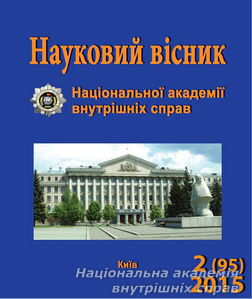Оperational-detective characteristic of illegal benefits
Keywords:
operational-detective characteristic, of illegal benefits
Abstract
In this article author reveals issues of operational-detective characteristic of illegal benefits, explains its differences from criminological and criminalistic characteristic. Author observe that criminal-legal characteristic determine: the consept of acceptance of the proposal, promising or receiving illegal benefit by an official (art. 368 of the Criminal codes of Ukraine), identifies its stages, determines the system of this crime and researching it in terms of public danger. It is noted that criminal signs are the source to operational characteristics of crimes, because in the absence of evidence of crime can not be a question of operational-search feature. Criminological characteristics contains information about criminogenic factors, state, structure and dynamics of illegal benefits and predict conditions, that have an influence on electing goal of a crime, time, place, method and others terms of preparation to committing a crime; the circumstances that contribute to the formation of offender, circumstances that improve the process of creating a goal of crime, the motives of the crime. Criminalistics characteristic is key starting point for the formation methods of investigating these crimes, where according to the general objectives of the criminal proceedings is made to ensure rapid, full and impartial investigation into these crimes, if the evidence obtained in the manner provided by law that are relevant for criminal proceedings and be proved. It is noted that operational-detective characteristic not duplicate content characteristics other data jurisprudence, but a independent type of complex characteristics of illegal benefit.Downloads
Download data is not yet available.
Abstract views: 70 PDF Downloads: 111
How to Cite
[1]
Gribovsky, A. 1. Оperational-detective characteristic of illegal benefits. Scientific Herald of the National Academy of Internal Affairs. 95, 2 (1), 68-77.
Issue
Section
Combating crimes: theory and practice
- Authors reserve the right to authorship of their own work and transfer to the magazine the right of the first publication of this work under the terms of the Creative Commons Attribution License, which allows other persons to freely distribute published work with mandatory reference to authors of the original work and the first publication of an article in this magazine.
- Authors have the right to enter into separate additional agreements on non-exclusive dissemination of the work in the form in which it was published in the journal (for example, to post an article in the institution's repository or to publish as part of a monograph), provided that the link to the first publication of the work in this journal is maintained.
- The journal's policy allows and encourages the posting of articles by authors on the Internet (for example, in electronic storehouses of institutions or on personal websites), both before the submission of this manuscript to the editorial office and during its editorial processing, as this contributes to the creation of a productive scientific discussion and positively affects the efficiency and dynamics of citing the published work.




